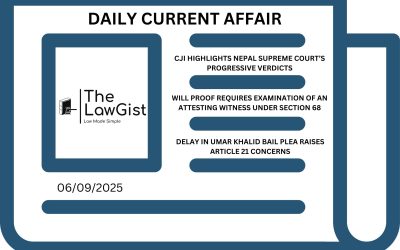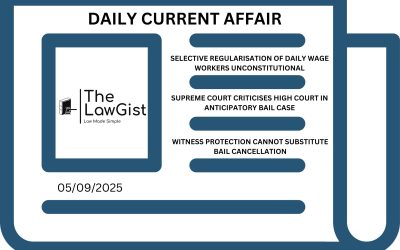
SUPREME COURT SETS ASIDE MADHYA PRADESH HC ORDER ON RESERVED CATEGORY CANDIDATES’ ADMISSION TO UR SEATS
Case Name: Ramnaresh @ Rinku Kushwah and Others vs. State of Madhya Pradesh and Others
Recently, Supreme Court ordered for the reserved category candidate that they can also avail the seat of unreserved category based on merit. It quashed the decision of Madhya Pradesh High Court that rejected the admission of reserved category candidates in unreserved quota.
Legal Provisions and Framework:
- Reservation Policy: In India, reservation is divided into vertical (e.g., SC/ST/OBC) and horizontal (e.g., women, disabled) reservations. Vertical reservations apply to specific social groups, while horizontal reservations cut across all vertical categories.
- Merit-Based Admission: The Supreme Court in Saurav Yadav vs. State of Uttar Pradesh clarified that reserved category candidates who qualify on merit should be treated as part of the unreserved (UR) category.
- Supreme Court’s Ruling: The Court applied this principle, ensuring that meritorious reserved category candidates who qualify on their own merit are entitled to UR seats. It upheld the concept that merit should not be compromised, even in the context of reservations.
|
SOURCE – SUPREME COURT OF INDIA
SUPREME COURT SLAMS CALCUTTA HC FOR SUGGESTING AMENDMENT TO DECRIMINALISE CONSENSUAL SEX AMONG OLDER TEENS
Case Name: In Re: Right to Privacy Of Adolescents, Suo Moto WP(C) No. 3 of 2023
The Supreme Court slammed the Calcutta HC for proposing amendments to the POCSO Act. As amendments would decriminalize consensual sexual acts between adolescents aged 16 and above. The Court reaffirmed the conviction of a man who was found guilty of sexually assaulting a 14-year-old girl, stressing that no minor is entitled to any purported consent.
Legal Provisions and Framework:
- POCSO Act, 2012: The Protection of Children from Sexual Offences (POCSO) Act criminalizes all sexual activities with minors (persons below 18 years) regardless of consent, focusing on protecting children from sexual exploitation and abuse.
- Indian Penal Code (IPC) Sections 376, 363, and 366: Section 376 deals with the offense of rape, while Sections 363 and 366 pertain to kidnapping and abduction for various purposes, including marriage. The Supreme Court held that the age of the victim (14 years) makes consent irrelevant under these provisions.
- Supreme Court’s Ruling: The Court disapproved of the Calcutta HC’s suggestion to amend the POCSO Act, reinforcing the stance that sexual activities involving minors, irrespective of consent, constitute serious offenses under existing laws.
|
SOURCE – SUPREME COURT OF INDIA
SUPREME COURT DECLINES EUTHANASIA PLEA, SEEKS BETTER TREATMENT FOR QUADRIPLEGIC MAN
Case Name: Harish Rana vs. Union of India and Ors.
The man’s request for mercy killing was rejected by the Supreme Court. SC said that it is an active, and not a passive case of euthanasia. Nevertheless, it sent notice to the Union Government telling them to improve facilities for the petitioner who has been bed-ridden since 2013 with a complete disability.
Legal Provisions and Framework:
- Passive Euthanasia: The Supreme Court in Common Cause v. Union of India (2018) recognized the right to passive euthanasia, allowing the withdrawal of life support for terminally ill patients in a permanent vegetative state. However, this is subject to strict guidelines and the presence of a “living will.”
- Active Euthanasia: Active euthanasia, which involves administering a lethal substance to cause death, is not legally permitted in India.
- Supreme Court’s Ruling: The Court ruled that the petitioner’s case did not qualify for passive euthanasia as he was not on life support. Instead, it focused on ensuring the petitioner receives better treatment, emphasizing that euthanasia laws only apply under specific, stringent conditions.
|
SOURCE – SUPREME COURT OF INDIA








